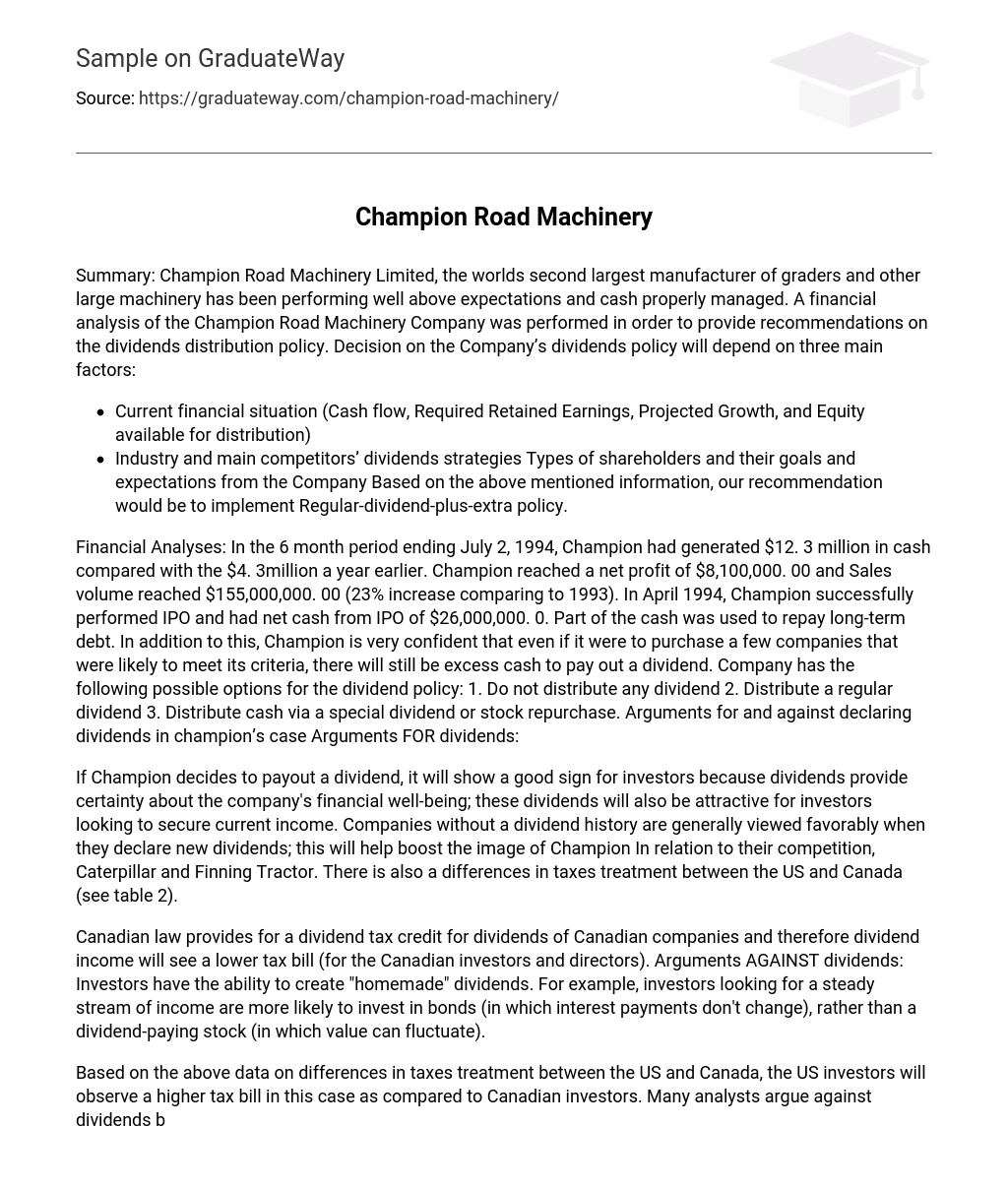Summary
Champion Road Machinery Limited, the second largest manufacturer in the world of graders and other large machinery, has exceeded expectations and effectively managed their cash. The company underwent a financial analysis to determine the best approach for distributing dividends. The decision regarding the company’s dividend policy will be based on three key factors:
- Current financial situation (Cash flow, Required Retained Earnings, Projected Growth, and Equity available for distribution)
- Industry and main competitors’ dividends strategies Types of shareholders and their goals and expectations from the Company Based on the above mentioned information, our recommendation would be to implement Regular-dividend-plus-extra policy.
Financial Analyses
In the period from January 2, 1994, to July 2, 1994, Champion generated $12.3 million in cash, which was a significant improvement compared to the previous year’s earnings of $4.3 million during the same time frame. Furthermore, Champion achieved a net profit of $8,100,000.00 and witnessed sales volume amounting to $155,000,000.00 (a 23% increase compared to 1993). In April 1994, Champion successfully conducted an initial public offering (IPO) and received $26,000,000.0 in net cash from it.
A portion of this cash was utilized for repaying long-term debt.
Moreover, Champion is highly certain that even when acquiring several companies that align with its standards, there will remain surplus funds to allocate for dividend distribution. The company has various potential choices for the dividend strategy:
- Do not distribute any dividend
- Distribute a regular dividend
- Distribute cash via a special dividend or stock repurchase.
Arguments for and against declaring dividends in champion’s case Arguments FOR dividends: If Champion decides to payout a dividend, it will show a good sign for investors because dividends provide certainty about the company’s financial well-being; these dividends will also be attractive for investors looking to secure current income. Companies without a dividend history are generally viewed favorably when they declare new dividends; this will help boost the image of Champion In relation to their competition, Caterpillar and Finning Tractor. There is also a differences in taxes treatment between the US and Canada.
Canadian law allows for a dividend tax credit for dividends from Canadian companies, resulting in a reduced tax burden for Canadian investors and directors. However, there are arguments against dividends. Investors can create their own dividends by opting for investments like bonds that offer a consistent income stream, rather than relying on dividend payments from stocks.
According to the data comparing tax treatment in the US and Canada, US investors will experience a larger tax payment than Canadian investors. Analysts often discourage dividends, suggesting that when a firm reinvests funds instead of distributing them as dividends, it can increase the overall value of the firm and subsequently boost the market value of its stock.
Champion has the option of investing in more projects or acquiring new companies and profitable assets. This is evident from their past acquisitions, such as the soil compactor and Bud Lee. Additionally, Champion can declare dividends. The amount per share (DPS) would be $0.59, with a total distribution of $6,600,000.00 in available equity. Shareholders should also take into consideration the dividend policies of Champion’s competitors.
When making decisions regarding dividend policies, management should also consider the expectations of its shareholders. Champion has three primary groups of shareholders:
- Seqouia – a private investment firm. It focuses on high risk opportunities with the potential growth in sales, earnings and cash flows, which would translate into stock appreciation. This group of shareholders could be interested in long-term growth rather then in giving out dividends now.
- Institutional investors (including large Canadian-based money managers & Retail Investors – mainly interested in capital gains rather then in regular dividends payments.
In summary, most shareholders would rather retain the cash within the company for future investments.
Conclusion and Recommendations
Should Champion declare dividends, and if so how much per share (DPS), and the total ($ amount)? We suggest that Champion adopt a Regular-dividend-plus-extra policy. This policy will allow them to distribute additional dividends during prosperous periods, when profits and cash flow are robust, while also remaining competitive in the market. For the year 1994, we propose a yearly regular dividend of $0.42 per share, based on the industry average. Additionally, we recommend setting aside $1,908,600 for special dividends, with a DPS of $0.17.





